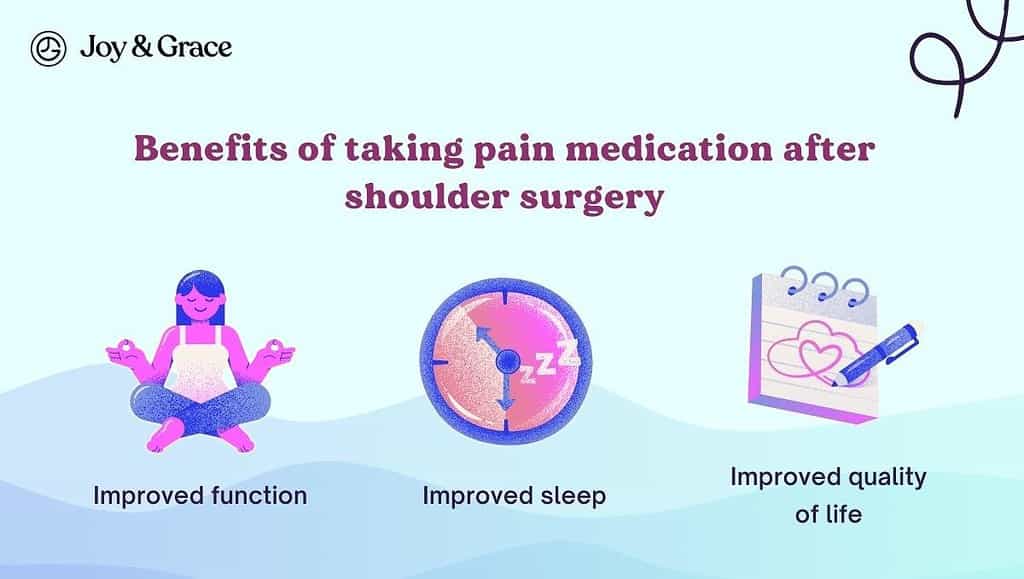If you're planning to undergo shoulder surgery, you likely have one goal in mind. This is to alleviate the pain and regain normal function in your shoulder. While it's true that surgery can be an effective way to achieve these goals, you'll likely experience some degree of pain after the procedure.
This can be a discomforting idea, especially after all you've been through. But don't worry. There are ways to control the pain after your surgery. Here, we'll explore some proven techniques for managing pain and recovering after shoulder surgery.
What Kinds Of Pain Will I Feel After Shoulder Surgery?

While post-op pain can be unavoidable, it won’t likely show up right away. You probably received a nerve block for the surgery, and because of this, you may feel a little numbness in your shoulder and arm. This should last for 12–24 hours. Once the effect of the nerve block wears off, you may feel the following:
- A sudden, sharp pain
- A dull or persistent, aching pain
- Pain that worsens with movement
- Shoulder stiffness
- Swelling around the surgical area
- Limited mobility and range of motion in the shoulder
- Inability to lift or raise the arm above the head
- Tingling or burning sensations in the shoulder, neck, or arm
But don’t get too disappointed. Studies show that post-op pain is significantly less than shoulder pain before surgery.
Who Is Going To Help Manage My Pain After Shoulder Surgery?

No need to worry. You're not alone on this journey! You'll have a whole team of experts to help you manage your pain after shoulder surgery.
First, your surgeon will be the one to give you instructions on how to take care of your shoulder post-surgery. They'll also prescribe any medication you may need to manage your pain.
Next, your physical therapist will be your new best friend! They'll help you regain your range of motion and strength and teach you exercises to help manage your pain.
You may also work with an occupational therapist, who will help you with activities of daily living. They'll teach you how to do things like brush your teeth, wash your hair, and do other tasks you may have difficulty with while your shoulder is healing.
Last but not least, your primary care physician will be available to help manage your pain and monitor your recovery. They'll be there to answer any questions and ensure you're on the right track.
What Are The Types Of Pain-Control Treatments I Can Have After Shoulder Surgery?

Several different types of pain-control treatments can be used after shoulder surgery, including:
- Medications
Your doctor may prescribe pain medication to help manage the acute pain that occurs immediately after surgery. They may also prescribe medication to manage chronic pain.
These can include over-the-counter medications such as ibuprofen or acetaminophen. In some cases, your doctor might give you prescription medications such as steroids or opioids. We’ll talk more about these drugs later in the article.
Physical therapy is an essential part of recovery after shoulder surgery. It helps to reduce pain, improve the range of motion, and strengthen the muscles around the shoulder.
It’s very important to immediately start with physical therapy and stick with it. According to one study, early physical therapy may help you recover faster.
Physical therapy may start 1-2 weeks after your surgery and may last up to 6 months.
- Occupational therapy
You may benefit from occupational therapy. Occupational therapy can help you with specific activities of daily living that require the use of your shoulders. It may also help you regain function.
What Drugs Will They Give Me After Shoulder Surgery?
- Acetaminophen
Acetaminophen can help relieve pain, but it does not have anti-inflammatory effects. It is usually the first drug prescribed for pain control, as it usually does not cause any side effects and does its job very well.
Just make sure not to take more than 8 tablets within 24 hours. Also, keep an eye on your other medications and make sure none of them contain acetaminophen.
- Non-steroidal anti-inflammatory drugs (NSAIDs)
These medications, such as ibuprofen or naproxen, can help reduce pain and inflammation. They do this by inhibiting the release of chemicals produced by injured cells and tissue.
Avoid taking these drugs on an empty stomach. If you have stomach ulcers or are using blood thinners, consult your doctor before taking them.
Steroid injections after shoulder surgery can help with pain relief and inflammation in the affected area. They work by delivering the steroid drug directly to the source of pain. This can provide fast and effective relief, allowing for improved mobility and speedy recovery.
According to one study, steroid injections given at 4 or 6 weeks post-surgery can help you recover your range of motion faster.
Acetaminophen and NSAIDs are usually prescribed together to relieve post-op pain effectively. There is another group of medications that may be prescribed after shoulder surgery. However, doctors are careful when prescribing them, as they have some pretty nasty side effects. These are:
- Opioids
These medications, such as morphine or oxycodone, can be used to manage severe pain. But these drugs can also have potential side effects, such as addiction and constipation. Because of the possible side effects, these medications are only given when you experience severe and persistent pain.
Some of the side effects include:
- Addiction
- Constipation
- Drowsiness
- Nausea
- Vomiting
- Slowed breathing, especially when taken with other drugs that can depress your respiratory system.
- Confusion and disorientation
- Euphoria
- Memory loss
- Coma
How Long Will I Need Pain Meds After Shoulder Surgery?
The duration of pain medication use after shoulder surgery can depend on the specific type of surgery and your healing process. In general, most people will need to take pain medication for the first 1-2 weeks after surgery to manage pain and discomfort.
According to a study, you can expect to recover 50% of shoulder function and most of the pain to be gone after 3 months. Your doctor may be able to take you off the pain medication by then.
How Long Is It Safe To Take Narcotics After Shoulder Surgery?
As we mentioned earlier, narcotics or opioids are a strong group of pain medications with serious adverse effects. During the first 24 to 48 hours, take them exactly as your doctor told you to.
As your pain starts to go away, you can stop taking the medicine daily and only take it when needed. You should still follow your doctor's instructions, though. Eventually, you may be able to substitute the narcotics with Tylenol.
Always remember not to take more than what is prescribed. Most doctors will have you off narcotics before 4-6 weeks after your shoulder surgery or as soon as possible.
What Are Some Of The Risks And Benefits Associated With Pain Medication?

When it comes to pain medication, there are definitely some pros and cons to consider. On the one hand, these medications can be incredibly helpful in terms of reducing pain and discomfort. They can also help you get moving and be more active, which can speed up your recovery.
Here are some of the benefits of taking pain medication after shoulder surgery:
- Improved function
By reducing pain, medication can help improve your ability to move and perform daily activities.
- Improved sleep
Pain can make it difficult to fall asleep or stay asleep. Medication can help to improve sleep quality. No more tossing and turning all night!
- Improved quality of life
By reducing pain, medication can help improve your overall quality of life.
On the other hand, there are some risks to be aware of. Aside from the ones we mentioned earlier, other risks include the following:
- Drug Tolerance
In the context of pain control, drug tolerance means that over time, the person taking pain medication may need higher doses to relieve pain. This occurs because the body gets used to the presence of the drug and no longer responds to it as strongly.
This can lead to a cycle of needing higher and higher doses to control the pain, increasing the risk of side effects. It may also potentially lead to drug dependence and addiction. This is especially true for opioids.
- Dependence and Addiction
Some painkillers, like opioids, can cause physical and mental dependence if used for a long time. Long-term use of painkillers can lead to addiction, which is when people keep using them even though they know it's bad for them.
- Overdose
Taking too much pain medication can lead to overdose, which can be life-threatening. This can happen with acetaminophen, NSAIDs, and opioids.
- Side effects
Painkillers can cause a wide range of side effects, such as nausea, dizziness, feeling sleepy, and trouble going to the bathroom.
- Drug Interactions
Pain medication can interact with other medications you're taking, which can lead to dangerous side effects.
Here are possible drug interactions that can occur if you take pain medication:
1. Acetaminophen and alcohol
Taking acetaminophen while drinking alcohol can increase the risk of liver damage. We should probably mention that you shouldn’t even be drinking while you're recovering from shoulder surgery.
2. NSAIDs and blood pressure medication
Taking NSAIDs with blood pressure medication can cause blood pressure to drop too low.
3. Opioids, benzodiazepines, and other sedatives
Taking opioids with benzodiazepines and other sedatives can increase the risk of breathing problems and overdose.
4. Steroids and diabetes medication
Taking steroids with diabetes medication can cause blood sugar to rise too high.
5. NSAIDs and anticoagulants
Taking NSAIDs with anticoagulants (blood thinners) can increase the risk of bleeding.
6. Acetaminophen and warfarin
Like NSAIDs, taking acetaminophen with warfarin (a blood thinner) can also increase the risk of bleeding.
7. Steroids and immunosuppressants
Taking steroids with immunosuppressants can increase the risk of infection.
What Can I Do To Help Keep My Pain Under Control?
Managing pain after shoulder surgery can be a bit of a journey, but with the right approach, you'll be feeling like yourself again in no time! Here are a few tips to help keep your pain under control:
- Follow your surgeon's instructions for pain management
Your surgeon will provide specific instructions for managing pain after surgery. This will include information on how to take your pain medication and when to take it. Be sure to follow these instructions closely.
- Use cold and heat therapy
Applying ice or heat to the affected area can help reduce pain and inflammation. Your surgeon or physical therapist will provide guidance on when and how to use these therapies.
If you’re considering heat therapy, check out our very own heating pad! It’s filled with aromatic herbs to help you relax and will definitely help you with your recovery.
- Rest and elevate
Resting and elevating your shoulder can help reduce pain and swelling. Be sure to follow any post-surgery instructions about how much you can do and how your shoulder should be placed.
- Exercise and physical therapy
As your pain subsides and you are able, you will begin physical therapy exercises to help you regain strength and range of motion. And, as we already said, it's important to keep up with your physical therapy and exercise sessions.
- Acupuncture
Acupuncture may be an option after shoulder surgery, but it is important to consult with your surgeon first. They can advise on whether acupuncture is safe and appropriate for you. In some cases, acupuncture may help with postoperative pain and rehabilitation.
- Daily Habits & Nutrition
Eat a healthy diet, stay hydrated, and avoid smoking. It can help speed up the healing process. - Keep track of your pain with a pain diary
Keep tabs on your pain with a fun journal! Jot down when you feel the pain and what makes it feel better or worse. This way, when you go to see the doctor, you'll have a super helpful diary to show them. They'll have all the information they need to help figure out your pain patterns.
It's important to be proactive when it comes to managing your pain. Don't be afraid to reach out to your healthcare provider if you have any concerns or if your pain is not well controlled. And remember, take it easy. Healing takes time, and you'll be back to your normal routine in no time!
Takeaway
In conclusion, shoulder surgery can come with its fair share of pain and discomfort, but the good news is that there are many ways to manage and control it.
Remember that everyone's recovery is different, and what works for one person might not work for another. That's why it's important to work closely with your healthcare team to find the best pain management plan for you.
We hope this article has helped tackle the different options for pain control after shoulder surgery. If you found it informative, remember to subscribe to our newsletter for more articles on health and wellness.















